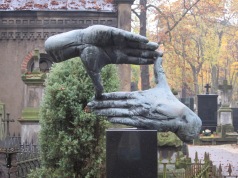• Early Music Show: Polish playlist
Friday, 24 February 2012 Leave a comment
Tomorrow and on Sunday, at 13.00-14.00, BBC Radio 3’s Early Music Show is devoting its attention to Renaissance and Baroque music from Poland. Saturday’s programme is a CD compilation; Sunday’s is a broadcast of music from a concert given by the Retrospect Ensemble at last year’s Lufthansa Festival in London (I posted on this two weeks ago under Baroque Rocks). Now that the programme details of the Saturday broadcast are available, I thought I’d pop them up alongside those for Sunday’s. Both programmes are presented by Lucie Skeaping, with me chipping in with the odd Polish word on the Sunday.
Saturday, 25 February 2012, 13.00-14.00
Johann Adolf Hasse (1699-1783): March of the King of Poland
Wacław z Szamotuł (c.1524-c.1560): Six Polish Songs
Giovanni Anerio (c.1567-1630): Jubilemus in arca Domini Dei
Mikołaj Zieleński (c.1550-c.1616?): Magnificat
Balint Bakfark (1507-76): Czarna krowa (Black Cow)
Matthäus Waissel (c.1540-1602): Polish Dance
Wojciech Długoraj (c.1557/8-after 1619): Fantasia and Chorea polonica
Bartłomiej Pękiel (?-c.1670): ‘O vita ista misera’ from the dialogue Audite mortales
Franciszek Lilius (c.1600-57): Tua Jesu dilectio
Johann Adolf Hasse: Dance of the King of Poland
The eagle-eyed will have noticed that there are some non-Polish composers here. Foreign musicians played an important part in Polish culture in the Renaissance and Baroque periods, among them the Italians Luca Marenzio and Marco Scacchi. Anerio was another. He spent the last six years of his life as choirmaster to King Sigismund III in Poland. The Hungarian Bakfark also had strong Polish connections. Hasse, though German, was musically an Italian and seems to have been almost entirely successful in avoiding Poland and Warsaw when his employer’s court moved there from Dresden. Waissel, the earliest composer in the programme, was German through and through, with no connection to Poland of which I am aware, so his Polish Dance must have been one of the genre of ‘characteristic national’ pieces that found their way into many lute tablatures in the Renaissance and early Baroque.
The Polish composers – z Szamotuł, Zieleński, Długoraj, Pękiel and Lilius – were key participants in their country’s musical development. The ‘Six [Religious] Polish Songs’ by z Szamotuł were not envisaged as a collection, but individually are among the most beautiful choral songs of the 16th century. My favourite is Modlitwa: Już się zmierzcha (Prayer: Dusk Is Falling), which was also one of Górecki’s ‘found’ treasures – he used it in three of his pieces.* Zieleński’s Magnificat is his crowning glory. Compared with the little that has survived of the music by other Polish Renaissance and Baroque composers, Zieleński’s surviving output is enormous and the DUX label in Poland has just issued a 6-CD set of his Offertoria et Communiones Totius Anni 1611 (DUX 0864). The second programme in this Early Music Show Polish weekend has more music by Zieleński.
The music by Długoraj (as well as by Bakfark and Waissel) is for lute. All three were noted players of their day. The music of Pękiel is too little known outside Poland, and this programme includes his Advent ‘dialogue’ Audite mortales, based on a paraphrase of the biblical account of the Last Judgment. Lilius was Pękiel’s predecessor at Wawel Cathedral in Kraków. He was the son of an Italian musician and his music embodies many of the different styles that came to characterise this era in Polish music.
* In the event, only three of the six songs by z Szamotuł were played (and they didn’t include Modlitwa!).
Sunday, 26 February 2012, 13.00-14.00 (see Baroque Rocks)
Adam Jarzębski (before 1590-after 1648): Canzon quinta
Mikołaj Zieleński (c.1550-c.1616?): Domus mea
Stanisław Sylwester Szarzyński (fl.1692-1713): Iesu spes mea
Adam Jarzębski: Chromatica
Damian Stachowicz (1658-99): Veni consolator
Grzegorz Gerwazy Gorczycki (1665(7?)-1734): Completorium

